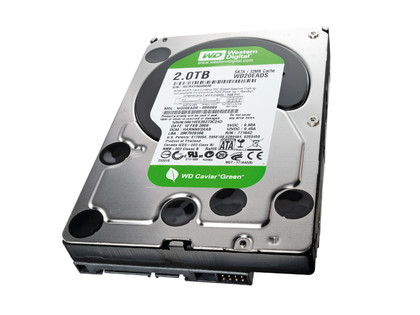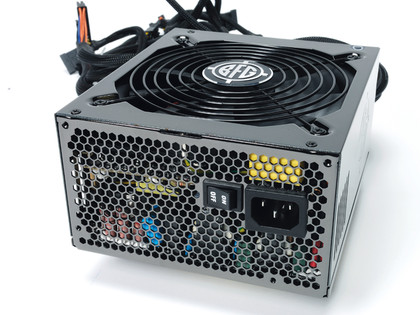The complete guide to upgrading your PC
Hard disks
Hard drives have maintained that unerring pace of progress that only computer components seem to achieve: the core technologies behind them are continuing to improve (leading to larger capacities and faster throughput), while the price tags just keep on dropping.
As a snapshot of the current state of the hard drive market, you can pick up a 1TB hard drive for as little as £60 to £70. The technological advances mean that such drives perform well too, with some managing read speeds as high as 80MB/s. If you want serious performance, though, there is a slightly more newsworthy addition to the storage market in the form of 'affordable' solid state drives (SSDs).

OLD FAITHFUL: Although SSD's offer much faster speeds, for cost you can't beat the humble harddrive
This technology has been rumbling along for years now, but the launch of the Intel X-25 pushed SSDs out from their niche to become a serious consideration for anyone looking for highperformance components. High-end SSDs offer read speeds of over 220MB/s, and much improved write performance.
Even if you can't afford a top-of-the range SSD, a low-end drive will generally give twice the performance of conventional platter-based drives. Ideally you want to set the SSD up as your main boot device, as it can as much as halve your boot time.
There are two significant downsides to SSDs, though: their capacities are tiny when compared to platter based drives, so you'll need one of those for your data anyway, and they're significantly more expensive than standard hard drives. If you can afford it, the best solution is to use an SSD as a boot drive and a conventional platter-based drive for your data.
Sign up for breaking news, reviews, opinion, top tech deals, and more.
Ultimate upgrade: It's not cheap and it's not particularly big, but it's incredibly fast – Intel's X25-E has made SSDs a real consideration for those looking for performance. It may hold only 32GB, but the X25-E will leave your existing hard drive looking pathetically slow.
Price: £325 (£283 ex VAT)
Info: www.intel.com
Best bang for the buck: The perfect accompaniment to an SSD or indeed as a main drive for the more cost conscious upgrader, the Hitachi Deskstar boasts a 16MB cache, 7,200rpm spindle speed and a cool 1TB of storage for a paltry sum.
Price: £59 (£51 ex VAT)
Info: www.hitachigst.com
Hold on for: The SSD market is still growing, but expect prices to settle a little over the coming year, thanks in part to improved support from Windows 7. Hybrid drives may off er the best of both worlds, so keep an eye out for them.
Power supplies
While it would be reassuring to think that the massive success of netbooks means that low-powered computing is infiltrating every aspect of our computing lives, the truth is that performance computing continues to increase the demand placed on our power supplies.
While we used to get by with the 250W PSUs that came bundled with PC cases, if you mean business then you're looking at making a separate purchase these days, and one that can set you back a tidy sum.

BFG: Remember to leave a little bit extra power with your PSU in case you need to upgrade again
It's not all bad news for the environment, though, as manufacturers are taking efficiency seriously – a lot of PSUs already offer 80 per cent efficiencies, but 85 per cent and 90 per cent models are on the way too. The hardest part about picking a power supply is working out how much power your machine needs.
Thankfully there are freely available tools to help you work this out, ranging from the simple to the exhaustive. Once you know how much power your system (or your potentially upgraded system) needs, give yourself a little room for further upgrades (50 to 100W) and you're done.
Ultimate upgrade: It's undoubtedly overkill for the vast majority of machines, but at least with the CoolerMaster Real Power 1,250W PSU you know that you won't be caught short on the power front, even if you fill your machine with all the best kit.
Price: £150 (£130 ex VAT)
Info: www.coolermaster.com
Best bang for the buck: Realistically your PSU needs are going to be quite modest, and a 500W model should really be more than enough. If you don't fancy shelling out too much dosh, the OCZ StealthXStream 500W Silent should have you covered for an upgrade or two.
Price: £43 (£37 ex VAT)
Info: www.ocztechnology.com
Hold on for: More efficient PSUs that can hit 90 per cent efficiency at high load are on their way, and while they may be more expensive to buy initially, they'll save you money over time.
One essential upgrade...
Sometimes you just can't afford to upgrade your whole system. If you can afford one upgrade, and only one, then how you spend your money should be dependent on what you use your machine for. Gamers have it easy – a new graphics card is generally the way to go as long as the processor isn't more than a couple of generations old.
If you move a lot of data around then a new hard drive makes sense. For heavy application use, the difference having an SSD as the main drive can make is simply incredible. However, for general day-to-day use, and for a more rounded upgrade for your money, we'd have to cheat a little and recommend that the move to the new Core i7 platform is the best upgrade you can make.
Intel has done a sterling job of shattering many of the bottlenecks of previous generations: the memory throughput is stunning, and the raw power of Core i7 makes light work of traditionally intensive tasks. It's not without its downsides, of course – and in the case of Core i7 the downside is very much financial – but if you need the power, there's nothing quite like it.
At least for now. It could easily turn out that the biggest threat to Core i7 is its soon-to-be-released sibling, Core i5.